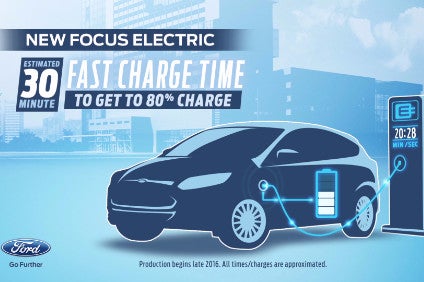
Ford said it was spending an extra US$4.5bn on “electrified vehicle solutions” by 2020 plus “changing how the company develops vehicle experiences for customers – all to make people’s lives better by changing the way the world moves”.
In other words, the automaker is adding 13 new electrified vehicles (hybrid, PHEV or pure EV) to its model line by 2020, when over 40% of its model lines will offer such versions and changing the way it does research into how buyers use their cars. This, it said, “represents [our] largest-ever electrified vehicle investment in a five-year period.”

Discover B2B Marketing That Performs
Combine business intelligence and editorial excellence to reach engaged professionals across 36 leading media platforms.
Future models include a redesigned Focus Electric with new DC fast-charge capability delivering an 80% charge in an estimated 30 minutes and projected 100-mile (160km) range – an estimated two hours faster than today’s Focus Electric and reasonably competitive with Nissan’s latest Leaf (which offers a larger battery and faster charging as options). The Focus EV goes into production late next year, for sale in North America and Europe, and will include a ‘SmartGauge with EcoGuide LCD instrument cluster’ with customisable displays of real-time EV power usage to help maximise efficiency, ‘brake coach’ which teaches drivers to use smooth braking to maximise energy captured through the regenerative braking system. Ford also promises the car will be fun to drive “with agile steering and handling engineered into the vehicle to give drivers a more connected feel to the road”.
Customer experience
The automaker also plans to focus more on the ‘customer experience’ and not just the vehicle itself and is changing its product development process.
“The challenge going forward isn’t who provides the most technology in a vehicle but who best organises that technology in a way that most excites and delights people,” said product development chief Raj Nair. “By observing consumers, we can better understand which features and strengths users truly use and value and create even better experiences for them.”
In addition to traditional market research, the company is spending on social science-based research globally, observing how consumers interact with vehicles and gaining new insights into the cognitive, social, cultural, technological and economic nuances that affect product design.
“This new way of working brings together marketing, research, engineering and design in a new way to create meaningful user experiences, rather than individually developing technologies and features that need to be integrated into a final product,” Nair said. “We are using new insights from anthropologists, sociologists, economists, journalists and designers, along with traditional business techniques, to reimagine our product development process, create new experiences and make life better for millions of people.”
Next year, Ford is doubling the number of projects that use such ‘ethnographic’ research compared with this year.
The team of social scientists already has spent months exploring topics such as the future of luxury transport, how people form relationships with their cars and the role of trucks in the American heartland.
ReD, a social science-based strategy consultancy, has been innovating with consumer goods and pharmaceutical companies for a decade. It started working with Ford – its sole automotive client – in 2012.
During the past three years, the team has spent around 4,000 hours with thousands of vehicle users in 25 cities worldwide, taking 80,000 photos, nearly 3,000 hours of video and more than 8,000 pages of field notes.
“For 70 years, market research has been done by asking people for their opinion. But Ford has always been fundamentally skeptical about that. Henry Ford used to say, ‘If I asked people what they wanted, they would have asked for a faster horse,’ ” said ReD founder Christian Madsbjerg. “I chose to work with Ford because this approach is in their DNA and is setting the company at the forefront of this advanced and bold process, which is redefining market research and silo-busting the way the company operates.”
Another new twist to the product development process is that designers no longer just sketch products but also full customer experience illustrations that visualise the experience each product is meant to deliver.






